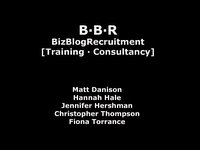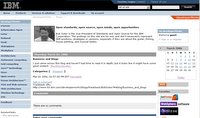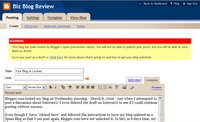Also, IPT hosted an open house tonight on "Relevance of Technology to Careers in Business". Although I was unable to attend, I look forward to hearing the outcome of this event.
By recognizing the impact of technology in business and therefore in the classroom, and by tailoring courses accordingly, the Marshall School of Business will prepare students to meet opportune moments with confidence and success.
Dr. Sandra Chrystal from USC's Center for Management Communication is one of the earliest pioneers in the field of blogging, wikis, podcasting, and PRS technology to enhance student learning.
On Tuesday, I presented corporate blogging and the use of my blog to Dr. Sandra Chrystal's Advanced Business Writing classes. Students gave valuable contributions to the discussion -- many of which can be viewed in the comments section of the post: "Non-Traditional Business Communications -- The Blog" posted 3/14/06.
We reviewed a number of the corporate blogs listed in the blogroll of my site -- such as Randy Baseler's Boeing Blog, Ted Leonis of Aol's Blog, and the GM Fastlane Blog -- this exercise proved most useful in identifying differences between the corporate blogs.
But I have specifically focused on Bob Sutor's blog (Bob Sutor is Vice President of Standards and Open Source at IBM) for a number of reasons:
- Bob Sutor uses his personal voice
- He discusses business issues and also personal tales in an appropriate manner for his position
- His writing style is professional yet relaxed enough for comfortable reading
- The layout of his site is easy to follow and his entries make sense even to someone from a non-tech background
- He links to his earlier personal blog sites and this shows his interests, his growth as a human being, and the evolution of his use of the blog as a communications tool -- for personal and for professional use
- As a reader, you feel a connection with Bob Sutor and therefore with IBM -- this blog is highly effective.
Students can discover and compare corporations through this medium and either determine a suitable fit for career objectives, or prepare projects in line with a specific corporation's interest. The corporate blogosphere platform presents an ocean that students can dive into and learn from.
Because it's a new medium, even corporations are testing the waters. Some more hesitant than others. Corporate blogging is learning in evolution -- for business, for schools, for faculty, and for students.
Here are some tips to get started:
- Take time to research our doubts about blogging -- is what stops us recognizing the value to a business blog legitimate?
- Speak with a blogger about corporate blogging
- Determine our blogging objective -- what will the blog represent/what is its use?
- Research, get help, decide on the engine (e.g. Blogger/Typepad) and on the look/layout
- Take the time to set it up and consider preferences such as comment moderation
- Solicit feedback on the initial blog layout and function
- Update the blog at least once a week with posts relevant to the blog objective/use
- Respond as much as possible to comments or feedback on the blog
- Copy and paste your template (html) in a Word Document in case something happens to your blog
- Interact with other bloggers with blogs relevant to your objective by commenting on their posts and linking to their sites






